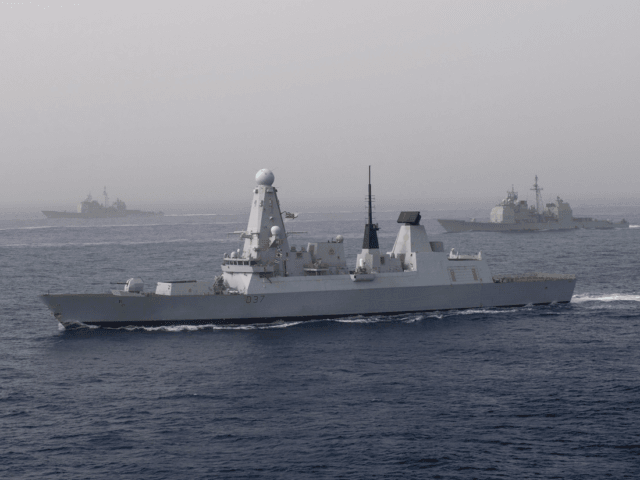The United Kingdom’s Royal Navy and the United States Navy are launching a joint task force to patrol the Strait of Hormuz, weeks after a British vessel was captured by Iranian gunboats in the strategic waterway.
The embarrassment to Britain at their only warship in the region having been too far away to prevent the “act of state piracy” when Iran captured the Stena Impero oil tanker was compounded when, last month, it was revealed the United States had already offered naval support.
Despite the United States Navy having more destroyers in the Persian Gulf than the Royal Navy has operating anywhere on earth, the British government turned down “repeated overtures” to establish a joint military task force to protect merchant shipping in the area as Theresa May and Philip Hammond did not want to give the impression to Iran and the European Union that she was siding with President Donald Trump.
When Virtue-signalling Goes Wrong: May Turned Down Trump Offer to Protect UK Ships to Please EU https://t.co/kGjUiENqX6
— Breitbart London (@BreitbartLondon) July 22, 2019
Days later, the British oil tanker was captured by a swarm of small gunboats and an Iranian flag hoisted on the mast.
The British government at that time insisted it wanted to continue to snub the United States and launch a naval task force with the European Union instead — despite the fact Britain is presently in the process of leaving the European Union — but the refusal of key partners including Germany to get involved scuppered the plan.
The United Kingdom has now announced its participation in a joint task force with the United States Navy, weeks after the original approaches by Washington to do so. The two British ships which are now in the region, air-warfare destroyer HMS Duncan [pictured with two U.S. Arleigh Burke Destroyers in April 2019, top] and anti-submarine warfare frigate HMS Montrose, will join with two USN Destroyers.
The British government’s official statement on the news called the mission an “international maritime security mission”, despite it consisting only of the United States and the United Kingdom, and again distanced itself from President Trump by affirming the government’s intention to keep the Iran nuclear deal alive:
The United Kingdom has reaffirmed its commitment to freedom of navigation and safe passage through the Gulf by playing a leading role in a new international maritime security mission, announced today. The mission will see the Royal Navy working alongside the US navy to assure the security of merchant vessels in the Strait of Hormuz… At the same time, the Government remains committed to working with Iran to reduce the current tensions and to the Iranian nuclear deal as the best means of preventing a nuclear-armed Iran.
Trump Backs Britain: ‘Iran Is In Big Trouble’ https://t.co/RvsmBTenca
— Breitbart London (@BreitbartLondon) July 20, 2019
Germany, the wealthiest country in continental Europe, was urged by the U.S. government to get involved in protecting global trade last month but refused. Despite that, in practice it is unlikely that the joint U.S.-UK taskforce would refuse to defend German-flagged shipping in the Persian Gulf, meaning once again the nation is enjoying the fruits of their NATO allies’ military expenditure without contributing to it.
This ongoing failure of Germany to contribute meaningfully to the NATO alliance from which it benefits, and even to maintain a military capable of performing basic tasks in future, has been a key focus of U.S. Ambassador to Berlin Richard Grenell. The Trump-picked Ambassador has recently been moved to remind Germany of the great toll in human life and military effort that the United States has endured to make Germany free in the past century, the nation having been a key focus in the Great and Second World Wars, as well as the Cold War where half of modern-day Germany was a Soviet state and a potential flashpoint.
Germany had obligations to its allies it was failing to fulfil, therefore.
Speaking to Breitbart London in 2018, Ambassador Grenell said that NATO members failing to meet their obligations was a top priority for President Trump, and said: “It is woeful; Germany is the largest economy in Europe… That’s one thing that’s missing from the German diplomatic conversation — they right now don’t have behind them a credible threat of military action.”
NATO ‘Ally’ Germany Won’t Back U.S. in Gulf to Avoid War with Iran https://t.co/eg5juzkVc9
— Breitbart London (@BreitbartLondon) July 31, 2019
Oliver JJ Lane is the editor of Breitbart London — Follow him on Twitter and Facebook

COMMENTS
Please let us know if you're having issues with commenting.